

The Ultimate Digital Nomad Guide to Bali (2025)
Bali has emerged as one of the world's premier digital nomad destinations, and for good reason.

1. Introduction to Bali for Digital Nomads
Why Bali Is a Popular Destination for Digital Nomads
Bali has emerged as one of the world's premier digital nomad destinations, and for good reason. This Indonesian island offers a unique blend of affordability, tropical beauty, and infrastructure that has attracted remote workers from around the globe. The island's popularity has only grown since the post-pandemic shift toward remote work, with many professionals choosing to trade office cubicles for beachside cafes and jungle co-working spaces.
What makes Bali particularly appealing is the balance it strikes between exotic adventure and modern convenience. While living in a tropical paradise, digital nomads can still access reliable internet, world-class amenities, and a thriving international community that makes the transition to island life remarkably smooth.
Overview of the Island's Culture, Lifestyle, and Appeal
Bali's cultural identity is deeply rooted in its unique form of Hinduism, which permeates all aspects of daily life. The island is known for its:
- Rich spiritual traditions: Daily offerings (canang sari) can be seen outside homes and businesses, while frequent ceremonies and temple festivals provide constant cultural immersion.
- Artistic heritage: Traditional music, dance, painting, and crafts flourish across the island.
- Wellness focus: Yoga, meditation, holistic healing, and plant-based cuisine have become integral to Bali's modern identity.
- Natural beauty: From volcanic mountains and terraced rice fields to coral reefs and black sand beaches, Bali's diverse landscapes offer endless exploration.
The Balinese lifestyle emphasizes balance between work, spirituality, community, and personal well-being—a philosophy that resonates with many digital nomads seeking more than just a pleasant work environment. This cultural atmosphere creates what many call the "Bali effect"—a noticeable shift in priorities and perspective that often leads nomads to extend their stays from months to years.
Popular Areas for Digital Nomads
Canggu
Often referred to as "digital nomad central," Canggu has evolved from a sleepy surf village to the island's premier remote work hub.
- Atmosphere: Laid-back beach vibe with a distinctly international feel
- Demographics: Young professionals, entrepreneurs, and creative freelancers
- Highlights: Surf beaches, trendy cafes, boutique shops, and the highest concentration of co-working spaces on the island
- Drawbacks: Increasing traffic congestion, rising prices, and areas that some feel have become "too westernized"
Ubud
Nestled among rice terraces and jungle ravines, Ubud offers a more nature-connected and wellness-focused environment.
- Atmosphere: Spiritual, artistic, and health-oriented
- Demographics: Wellness professionals, writers, artists, and older digital nomads
- Highlights: Yoga studios, healthy food scene, traditional arts, and lush natural surroundings
- Drawbacks: Distance from beaches, humidity, and macaque monkeys that can be aggressive
Seminyak
More established and upscale than Canggu, Seminyak attracts professionals seeking more luxurious accommodations and amenities.
- Atmosphere: Sophisticated and cosmopolitan
- Demographics: Higher-budget remote workers, executives, and established entrepreneurs
- Highlights: Beautiful beaches, high-end restaurants, luxury villas, and vibrant nightlife
- Drawbacks: Higher cost of living and more touristy atmosphere
Uluwatu
Growing in popularity, this clifftop area on the Bukit Peninsula offers stunning ocean views and a quieter lifestyle.
- Atmosphere: Dramatic and secluded
- Demographics: Surfers, privacy-seekers, and those looking for inspiration
- Highlights: World-class surf breaks, breathtaking cliffside locations, and fewer crowds
- Drawbacks: More isolated, requiring transportation for most services
Denpasar
The island's capital city provides a more authentic Indonesian urban experience with better affordability.
- Atmosphere: Bustling, local-oriented city life
- Demographics: Budget-conscious digital nomads and those seeking cultural immersion
- Highlights: Lower costs, authentic local cuisine, and fewer tourists
- Drawbacks: Less established nomad community, fewer western amenities, and more urban challenges
Emerging Areas: Amed, Lovina, and Nusa Islands
For those seeking the "next frontier" of digital nomad destinations in Bali:
- Amed: Quiet black sand beaches and excellent diving on the northeastern coast
- Lovina: Dolphin-watching and relaxed atmosphere on the northern coast
- Nusa Islands: Neighboring islands (Nusa Penida, Nusa Lembongan, Nusa Ceningan) with stunning landscapes and growing infrastructure

2. Visa Options & Necessary Documentation
Understanding visa requirements is crucial for a successful stay in Bali. The Indonesian government has introduced several options that can accommodate digital nomads, though some creativity may be required as remote work isn't officially recognized under most visa categories.
Tourist Visa (B211A)
The most common entry point for digital nomads testing the waters in Bali.
- Duration: Initially 60 days
- Extensions: Can be extended up to 4 times (30 days each), allowing for a total stay of 180 days
- Application Process:
Apply through an authorized visa agent or Indonesian embassy/consulate
Provide passport, photos, onward ticket, and proof of sufficient funds
Pay the visa fee (approximately $50-100 USD depending on embassy)
- Limitations: Officially does not permit work, including remote work for foreign companies
- Reality: Many digital nomads use this visa while working remotely, as enforcement regarding online work for foreign companies is minimal
Social-Cultural Visa (B211)
Popular among longer-term digital nomads due to its flexibility.
- Duration: Initially 60 days
- Extensions: Can be extended up to 4 times (30 days each), allowing for a total stay of 180 days
Requirements:
- Sponsor letter from an Indonesian citizen or registered organization
- Passport valid for at least 12 months
- Proof of accommodation in Indonesia
- Return ticket (though this requirement is sometimes waived)
- Proof of sufficient funds (bank statements)
- Application Process: Similar to the tourist visa but requires the additional sponsorship letter
- Cost: Approximately $100-150 USD for the initial visa plus extension fees
- Limitations: Technically for social, cultural, or educational activities, not work
Business Visa
Available in single-entry and multiple-entry formats, this option provides more legitimacy for those working with Indonesian businesses.
Single-Entry Business Visa
- Duration: 60 days
- Extensions: Can be extended up to 4 times (30 days each)
- Requirements: Business letter from an Indonesian company sponsor
- Best for: Short business trips or exploring potential partnerships
Multiple-Entry Business Visa
- Duration: Valid for 12 months
- Stay Limitation: Maximum 60 days per visit
- Re-entry: Unlimited during the validity period
Requirements:
- Sponsorship letter from an Indonesian business entity
- Business documentation showing relationship with sponsor
- Company registration documents of the sponsor
- Cost: Approximately $200-250 USD
- Advantage: Ideal for digital nomads who need to make regular trips in and out of Indonesia
KITAS (Temporary Stay Permit)
This is the most formal residency option, offering longer stability.
- Duration: Available for 6 months, 1 year, or 2 years
Eligibility: Requires one of the following:
Employment with an Indonesian company
Marriage to an Indonesian citizen
Investment in an Indonesian business (PT PMA)
Retirement (with age and financial requirements)
Process:
- Sponsorship from eligible entity
- Multiple government department approvals
- In-country processing including biometrics
Benefits:
- Legal residency status
- Ability to open local bank accounts
- Driver's license eligibility
- Multiple entry/exit privileges
- Cost: $1,000-1,500 USD depending on duration and type
- Considerations: Complex application process usually requiring agent assistance
Digital Nomad Visa
In response to the growing digital nomad movement, Indonesia has been developing a specific visa category.
- Status (as of March 2025): The "Second Home Visa" program has been implemented, allowing stays of up to 5 years for those meeting financial requirements.
- Financial Requirements: Proof of funds equivalent to approximately $130,000 USD in a bank account
Benefits:
- Long-term legal status
- Explicit permission for remote work
- Multiple entry privileges
- Simplified tax situation
- Limitations: High financial requirements make it accessible primarily to established professionals
- Application Process: Through Indonesian embassies abroad or via approved agents
Necessary Documentation for Visa Applications
Regardless of visa type, prepare these essential documents:
- Passport valid for at least 12 months beyond intended arrival
- Digital passport-sized photos with red or blue background (4x6cm)
- Proof of accommodation in Bali (hotel bookings or rental agreement)
- Return/onward flight ticket (even if you plan to extend)
- Recent bank statements showing sufficient funds (minimum $2,000 USD equivalent)
- Travel insurance documentation (increasingly checked at immigration)
- Completed visa application forms (specific to visa type)
- Sponsorship letters (where applicable)
- COVID-19 vaccination certificate (requirements may change)
Practical Tips for Visa Runs and Visa Agents
Visa Runs
- Popular Destinations: Singapore, Kuala Lumpur, Bangkok
- Budget Options: Johor Bahru (Malaysia) and Hat Yai (Thailand)
- Timing: Leave at least 7-10 days before visa expiration
- Documents to Bring: Same as initial application plus existing visa documentation
Efficiency Tips:
- Book early morning flights to allow same-day visa application
- Consider using premium processing where available
- Pre-book appointment at embassy/consulate where possible
Visa Agents
Working with reputable visa agents can simplify the process considerably:
Benefits of Using Agents:
- Navigating complex bureaucracy
- Access to sponsors for social-cultural visas
- Handling extensions without personal visits to immigration
- Troubleshooting unexpected issues
Recommended Agents:
- Bali Viza (baliviza.com)
- Bali XP (balixp.com)
- Visa4Bali (visa4bali.com)
- Bali Management Villas (balimanagementvillas.com)
Average Costs:
- Initial visa assistance: $50-100 USD (plus visa fees)
- Extension services: $50-80 USD per extension (plus government fees)
- KITAS assistance: $300-500 USD (plus permit costs)
Red Flags When Choosing Agents:
- Unusually low prices
- Promises that sound too good to be true
- Reluctance to provide references
- Poor communication
Official Government Resources
- Indonesian Immigration Website: www.imigrasi.go.id
- Indonesian Directorate General of Immigration: https://www.imigrasi.go.id/en/
- Indonesian Embassy Finder: https://kemlu.go.id/portal/en/list-of-mission

3. Travel Insurance Recommendations
Importance of Travel Insurance for Digital Nomads
For digital nomads, comprehensive travel insurance isn't just a precaution—it's an essential safety net. Bali's medical facilities, while improving, can be expensive for serious conditions, and evacuation to Singapore or Australia might be necessary for complex medical issues. Beyond health concerns, insurance protects your ability to work by covering:
- Stolen or damaged equipment
- Trip interruptions affecting client commitments
- Emergency returns home
- Legal assistance in unfamiliar jurisdictions
Many visas now require proof of travel insurance, and healthcare in Bali operates on a pay-first basis, making adequate coverage critically important.
Recommended Providers
SafetyWing
The first insurance designed specifically for digital nomads.
- Coverage Highlights: Medical emergencies, evacuation, limited electronics coverage, some COVID-19 coverage
- Strengths: Subscription model allowing continuous coverage, worldwide coverage including limited home country visits
- Limitations: Lower coverage limits, limited adventure activity coverage
- Cost: Approximately $42 USD per month for ages 18-39
- Best For: Budget-conscious nomads needing long-term, continuous coverage
- Website: safetywing.com
World Nomads
Comprehensive coverage with strong adventure sports protection.
- Coverage Highlights: High medical limits, extensive adventure activities, better electronics coverage
- Strengths: Coverage for 200+ adventure activities, good for active lifestyles
- Limitations: Higher cost, age restrictions, not designed for permanent travel
- Cost: Approximately $120-200 USD per month depending on plan and age
- Best For: Active nomads participating in adventure sports and carrying valuable equipment
- Website: worldnomads.com
IMG Global
Flexible plans with strong healthcare focus.
- Coverage Highlights: Extensive medical coverage, evacuation, some equipment coverage
- Strengths: Various plan levels, good for US citizens, renewable long-term
- Limitations: Less comprehensive adventure activity coverage
- Cost: Wide range from $40-200 USD monthly depending on plan and deductible
- Best For: Nomads prioritizing medical coverage with varied budget options
- Website: imglobal.com
Allianz Travel Insurance
Established global provider with strong reputation.
- Coverage Highlights: Comprehensive medical, good trip interruption coverage
- Strengths: Reliable claims process, worldwide support network
- Limitations: Short-term focus, less adapted to nomad lifestyle
- Cost: Approximately $100-250 USD per month depending on coverage
- Best For: Short-term trips and those preferring an established insurance company
- Website: allianztravelinsurance.com
Insured Nomads
Newer provider specifically designed for remote workers and digital nomads.
- Coverage Highlights: Telemedicine services, coverage for coworking injuries, digital security
- Strengths: Modern approach with digital focus, good for remote workers
- Limitations: Less established claims history
- Cost: Approximately $60-175 USD monthly depending on plan
- Best For: Tech-focused nomads wanting digital-oriented benefits
- Website: insurednomads.com
What Coverage to Look For
Essential Coverage Elements
Medical coverage: Minimum $100,000 USD, ideally $250,000+
Emergency evacuation: Minimum $100,000 USD
Repatriation of remains: Minimum $50,000 USD
Personal liability: Minimum $100,000 USD
Electronics/equipment: Coverage for laptop and essential work tools
Trip interruption/cancellation: Covering unexpected changes
COVID-19 coverage: Treatment and quarantine expenses
Additional Valuable Coverage
- Adventure activities: Surfing, scooter riding, diving (common in Bali)
- Natural disaster protection: Relevant for Indonesia's volcanic activity
- Political evacuation: Rare need but valuable protection
- Rental vehicle damage: For scooter or car rentals
- Dental emergencies: Often excluded from basic plans
Cost Comparison and Analysis
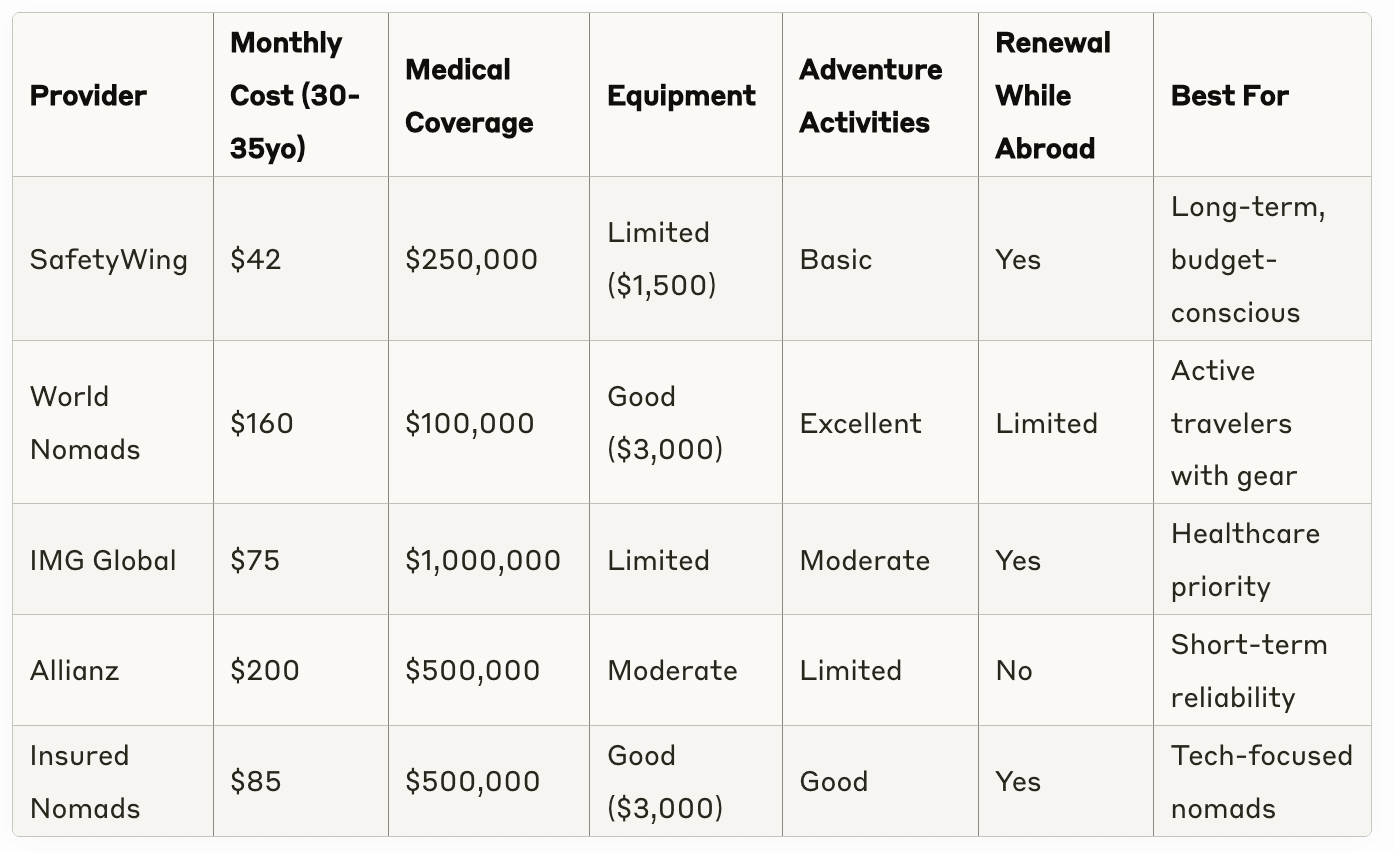
Real Experiences
"After a scooter accident in Canggu, my SafetyWing insurance covered my hospital stay and follow-up appointments. The claim process was straightforward—I submitted everything online and was reimbursed within two weeks." — Max, Software Developer
"When my laptop was stolen from a coworking space in Ubud, World Nomads covered the replacement cost minus the deductible. Their 24/7 assistance line helped me file a police report correctly, which was essential for the claim." — Sarah, Digital Marketer
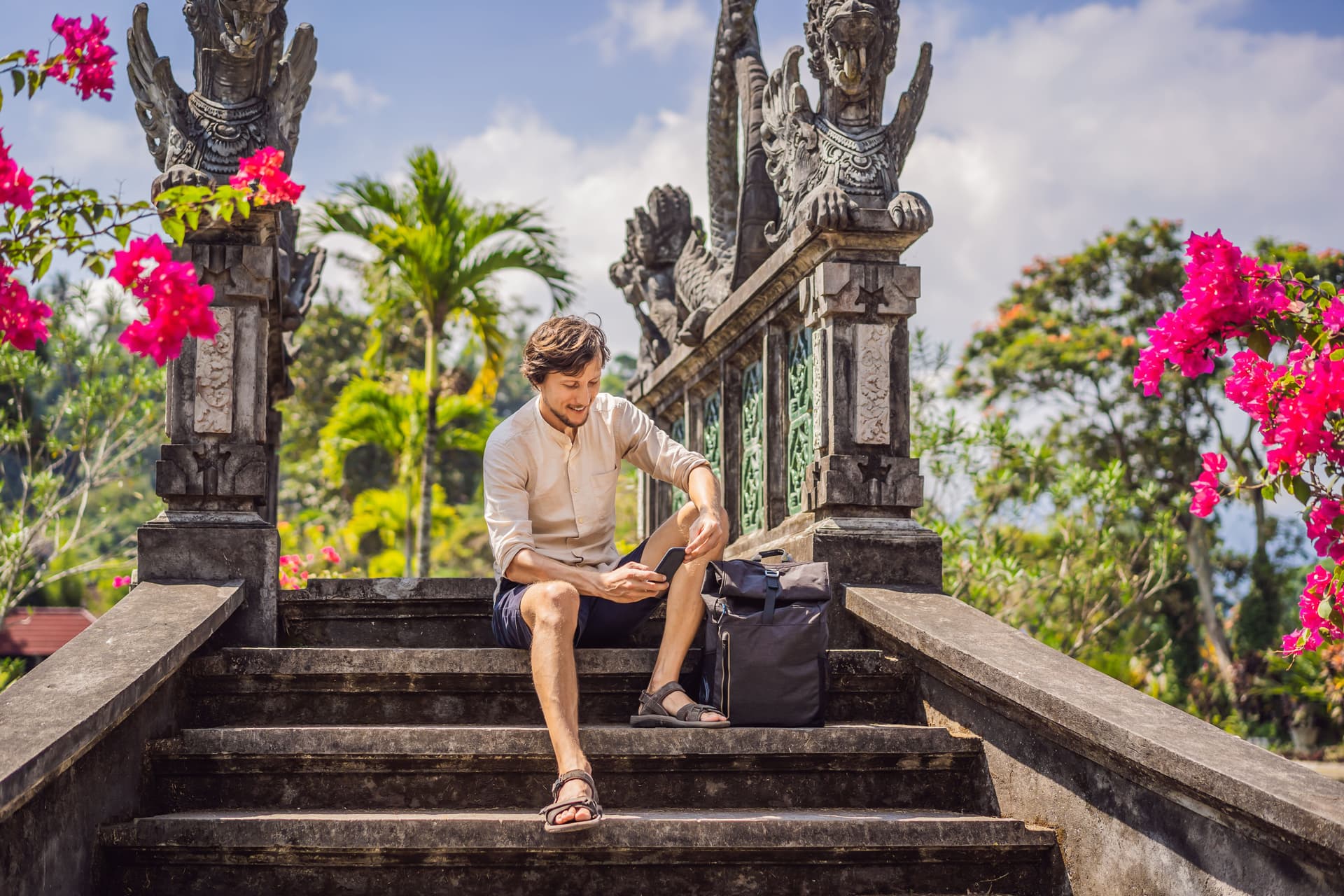
4. Living Costs in Bali
Breakdown of Monthly Expenses
Accommodation
Accommodation represents the most significant expense and varies dramatically based on location, quality, and lease duration.
- Villa Rentals
- Budget: $400-700 USD/month
- Basic 1-bedroom villa, potentially shared pool, less desirable location
- Mid-range: $700-1,200 USD/month
- 1-2 bedroom villa, private or shared pool, good location
- Luxury: $1,500-5,000+ USD/month
- 2+ bedrooms, private pool, premium location, modern amenities
Guesthouses & Homestays
- Budget: $200-350 USD/month
- Simple room, fan cooling, shared bathroom
- Mid-range: $350-600 USD/month
- Private room with ensuite, AC, basic kitchenette
- Cost-saving tips:
- Monthly rates offer 30-50% discounts compared to daily rates
- Negotiating directly with owners often yields better prices than platforms
- Shoulder season (Feb-May, Sep-Oct) offers better rates
Co-living Spaces
Average cost: $600-1,200 USD/month
- Popular options:
- Outpost (Ubud, Canggu)
- Tropical Nomad (Canggu)
- Roam (Ubud)
- Dojo Coliving (Canggu)
Benefits:
- Built-in community
- Turnkey solution with all utilities included
- Often includes coworking access
- Networking opportunities
Food
Bali offers exceptional food value, particularly if you embrace local cuisine.
Local Warungs (Indonesian eateries)
- Average meal cost: $1.50-3 USD
- Monthly budget eating primarily at warungs: $200-300 USD
- Popular dishes: Nasi campur, mie goreng, gado-gado, sate
Western Restaurants
- Average meal cost: $7-15 USD
- Monthly budget eating primarily Western food: $500-700 USD
- Specialty options: Vegan cafes, organic restaurants, international cuisine
Grocery Shopping
- Local markets: $30-50 USD weekly for fruits, vegetables, basics
- Supermarkets (Pepito, Popular, Bintang): $50-100 USD weekly including imported items
- Cost-saving tips:
- Shop at traditional markets for produce (Canggu Morning Market, Ubud Market)
- Buy imported goods from larger supermarkets like Pepito Market or Bintang
- Join buying groups via Facebook to purchase organic produce directly from farmers
Transportation
Scooter Rentals
- Monthly rental: $50-80 USD
- Purchase price: $700-1,500 USD for used scooter (worth considering for stays over 6 months)
- Gasoline: $5-10 USD weekly depending on travel frequency
- Considerations:
- International Driver's Permit is legally required
- Quality helmets are essential (bring from home if possible)
- Insurance typically not included with rentals
Ride-sharing Apps
- GoJek and Grab:
- Short trips (under 3km): $1-3 USD
- Medium trips (3-10km): $3-7 USD
- Monthly budget relying on apps: $200-400 USD
Car Rentals
- Daily rates: $20-40 USD
- Monthly rates: $300-600 USD
- Driver services: $40-60 USD per day
Utilities
Electricity
- Minimal use (fan, occasional AC): $30-50 USD monthly
- Regular AC use: $100-200 USD monthly
- Note: Electricity is often charged separately in villas based on meter readings
Water
- Municipal supply: Usually included in rent
- Drinking water: $15-30 USD monthly for delivered gallons
Internet
- Shared accommodations/coworking: Typically included
- Private fiber connection: $35-60 USD monthly for 50-100 Mbps
- 4G backup solutions: $20-30 USD monthly for 100GB data
Phone Service
- Local SIM card providers: Telkomsel, XL, Indosat
- Monthly package with data: $10-25 USD for 30-100GB
Entertainment and Activities
Yoga Classes
- Drop-in session: $8-15 USD
- Monthly unlimited package: $100-200 USD
- Popular studios: The Yoga Barn (Ubud), The Practice (Canggu), Radiantly Alive (Ubud)
Gym Memberships
- Local gym monthly rate: $30-60 USD
- Premium fitness clubs: $80-150 USD
- Popular options: Bali Training Centre, S2S Crossfit, F45
Surfing
- Board rental: $5-10 USD per day
- Surf lessons: $25-40 USD per session
- Monthly surfboard rental: $80-150 USD
Nightlife
- Local beer (Bintang): $2-3 USD in stores, $3-6 USD in bars
- Cocktails: $5-10 USD
- Club entrance fees: $10-25 USD for special events
- Monthly entertainment budget: $100-400 USD depending on frequency
Day Trips and Activities
- Guided hikes: $30-50 USD
- Waterfall trips: $20-40 USD
- Snorkeling/diving: $40-120 USD
- Cooking classes: $30-50 USD
- Monthly activities budget: $100-300 USD
Comparison Between Different Areas
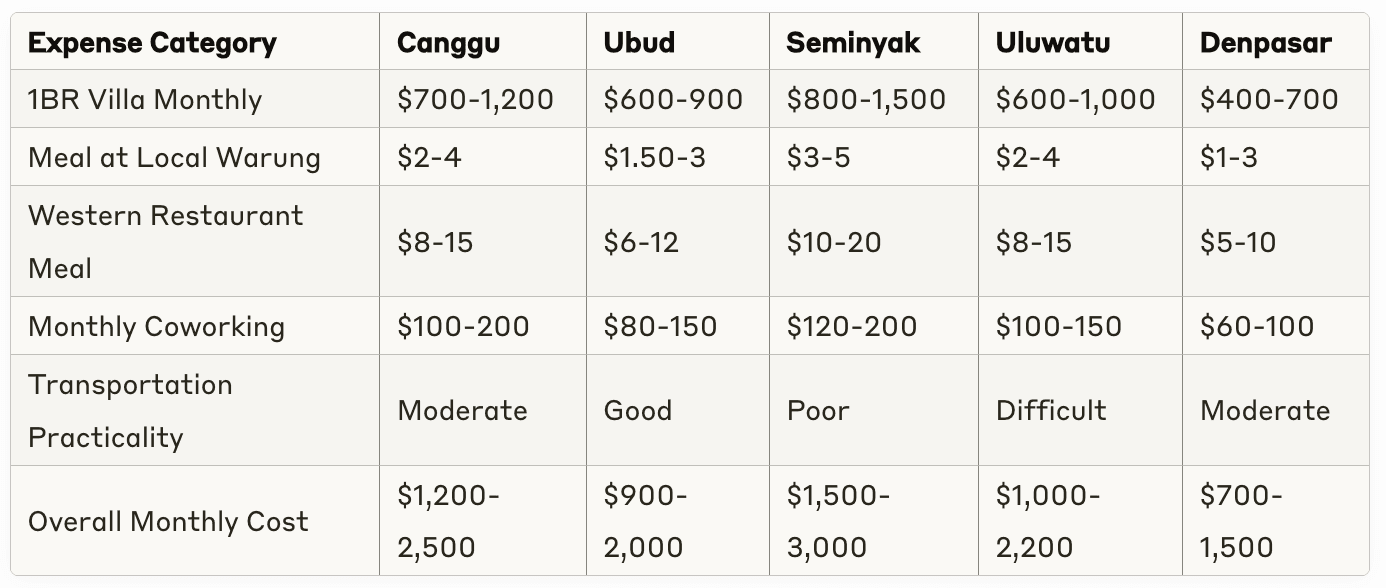
Average Costs: Short-Term vs. Long-Term Stays
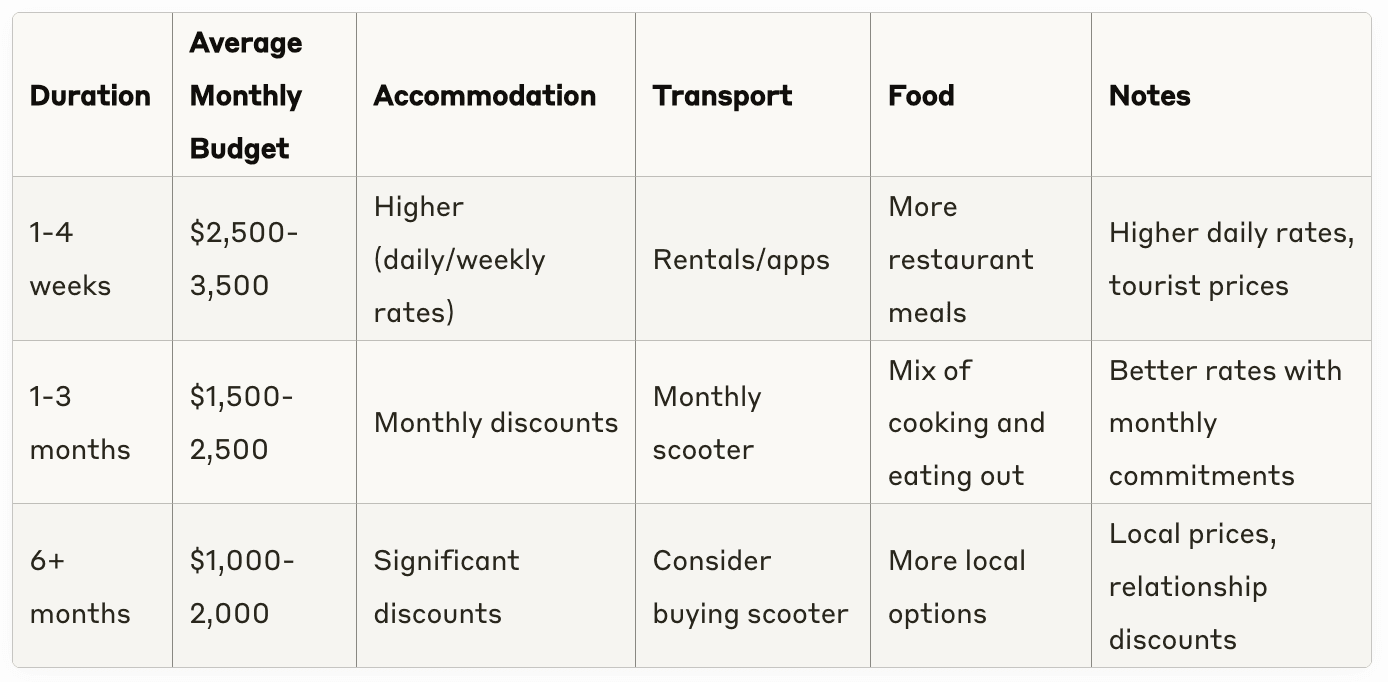
Budgeting Tips for Digital Nomads
Accommodation Strategies:
- Book the first few nights in advance, then search locally
- Join Facebook groups: "Bali Housing & Accommodation" and "Ubud Rentals"
- Negotiate longer stays for 30-50% discounts
- Consider house-sitting opportunities through TrustedHousesitters
Food Hacks:
- Follow the locals for authentic, affordable warungs
- Use GoJek's GoFood for delivery with minimal markup
- Shop at morning markets for fresh produce
- Refill water bottles at stations (typically 5,000 IDR) instead of buying single-use
Transportation Savings:
- Rent scooters monthly for best rates
- Use Gojek/Grab for longer journeys or bad weather
- Consider scooter purchase for stays over 6 months
- Join rideshare groups on Facebook for airport transfers
Work Expenses:
- Calculate cost-benefit of coworking vs. cafes
- Consider packages: many cafes offer daily consumption minimums that cost less than coworking
- Invest in mobile hotspot as backup internet
Lifestyle Adjustments:
- Happy hour specials offer 2-for-1 deals at many venues
- Tourist attractions are cheaper with local guides
- Many luxury villas offer significant discounts in low season
- Consider sharing premium villas with other nomads for luxury at budget prices

5. Coworking Spaces & Internet Quality
Best Coworking Spaces in Bali
Canggu Coworking Spaces
Dojo Bali
- Location: Echo Beach area
- Pricing: Day pass $15 USD, monthly from $175 USD
- Facilities: Multiple work areas, meeting rooms, pool, cafe, events
- Community: Strong digital nomad focus, regular events
- Atmosphere: Social, collaborative, beach-adjacent
- Internet: Fiber-optic 500 Mbps with backup lines
- Hours: 24/7 access for members
- Website: dojobali.org
Tropical Nomad
- Location: Berawa area
- Pricing: Day pass $13 USD, monthly from $150 USD
- Facilities: Ergonomic seating, Skype booths, cafe, events
- Community: Entrepreneur-focused, networking events
- Atmosphere: Modern, productive, air-conditioned comfort
- Internet: 300 Mbps with backup
- Hours: 8am-10pm, extended for members
- Website: tropicalnomad.com
B Work
- Location: Batu Bolong
- Pricing: Day pass $10 USD, monthly from $120 USD
- Facilities: Indoor/outdoor spaces, standing desks
- Community: Mix of locals and international
- Atmosphere: Relaxed, creative
- Internet: 200 Mbps
- Hours: 8am-8pm
- Website: bworkbali.com
Ubud Coworking Spaces
Hubud (Historical Note: While Hubud closed in 2020, it's been replaced by Outpost Ubud Central)
- Location: Monkey Forest Road area
- Pricing: Day pass $18 USD, monthly from $190 USD
- Facilities: Bamboo structure, meeting spaces, events
- Community: Established entrepreneur network
- Atmosphere: Bamboo architecture, jungle setting
- Internet: 300 Mbps with backup
- Hours: 7am-11pm
- Website: outpost-asia.com
Outpost
- Location: Nyuh Kuning (newer campus location south of central Ubud)
- Pricing: Day pass $14 USD, monthly from $160 USD
- Facilities: Pool, cafe, coliving option, Skype booths
- Community: Professional, productivity-focused
- Atmosphere: Modern facility with rice field views
- Internet: 250 Mbps with backup
- Hours: 24/7 for members
- Website: outpost-asia.com
Livit Hub
- Location: Penestanan area
- Pricing: Day pass $10 USD, monthly from $130 USD
- Facilities: Garden setting, cafe, events
- Community: Intimate, focused on deep work
- Atmosphere: Serene, less crowded
- Internet: 200 Mbps
- Hours: 8am-8pm
- Website: livit.io/hubud
Seminyak Coworking Spaces
Biliq
- Location: Central Seminyak
- Pricing: Day pass $15 USD, monthly from $170 USD
- Facilities: Modern office setup, meeting rooms
- Community: Business professional focus
- Atmosphere: Corporate, premium
- Internet: 300 Mbps
- Hours: 9am-9pm
- Website: biliq.com
Finns Recreation Club (Day passes available with club access)
- Location: Berawa/Canggu boundary
- Pricing: Day pass $25 USD (includes facilities)
- Facilities: Full sporting club with pool, gym, restaurants
- Community: Expat professionals
- Atmosphere: Luxury club with work options
- Internet: 200 Mbps
- Hours: 6am-10pm
- Website: finnsrecclub.com
Comparison of Coworking Options by Area
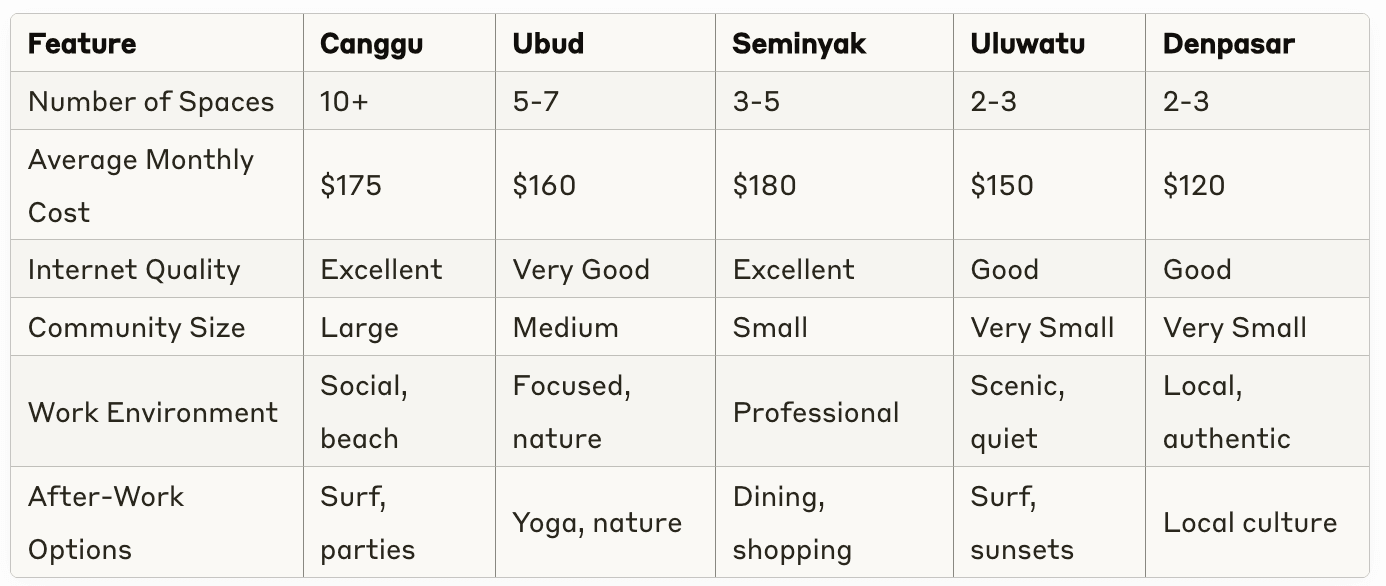
Internet Quality and Availability in Bali
Average Speeds by Area
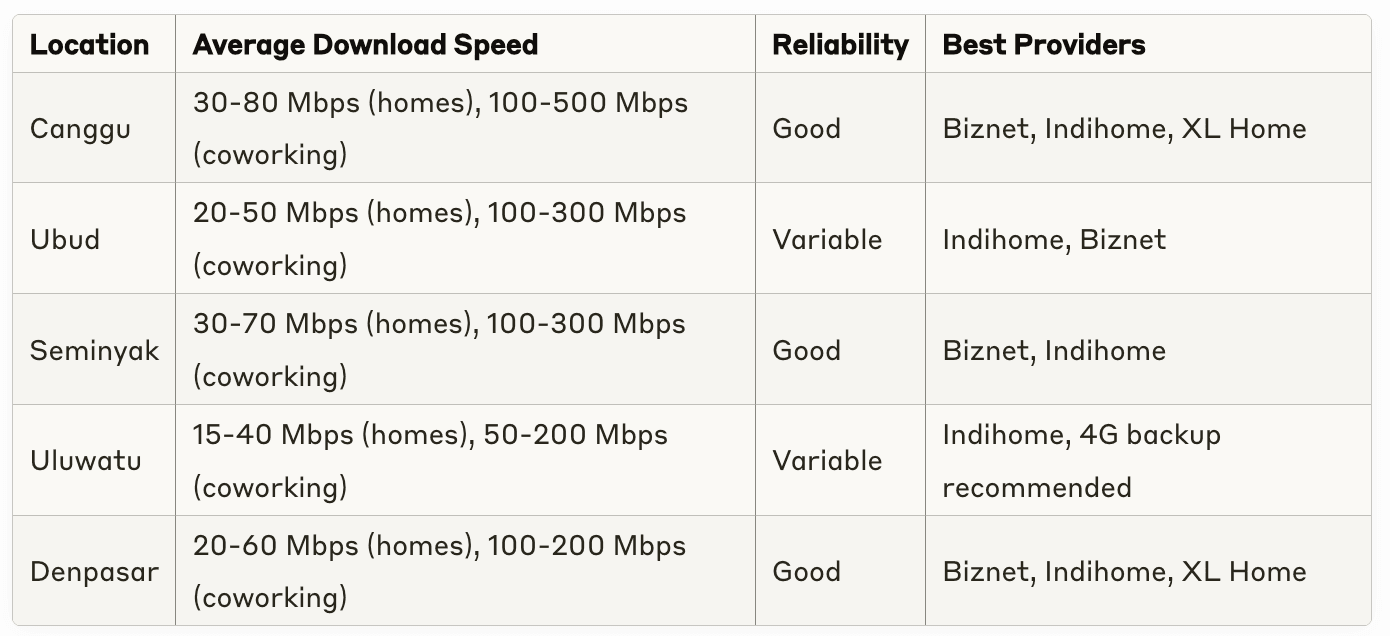
Best Internet Providers for Private Accommodations
Biznet
- Speeds offered: 75-300 Mbps
- Monthly cost: $35-70 USD
- Installation time: 3-7 days
- Contract requirement: Typically monthly
- Availability: Limited to certain areas, strongest in Canggu, Seminyak
- Reliability: Generally considered the most reliable option
**Indihome
